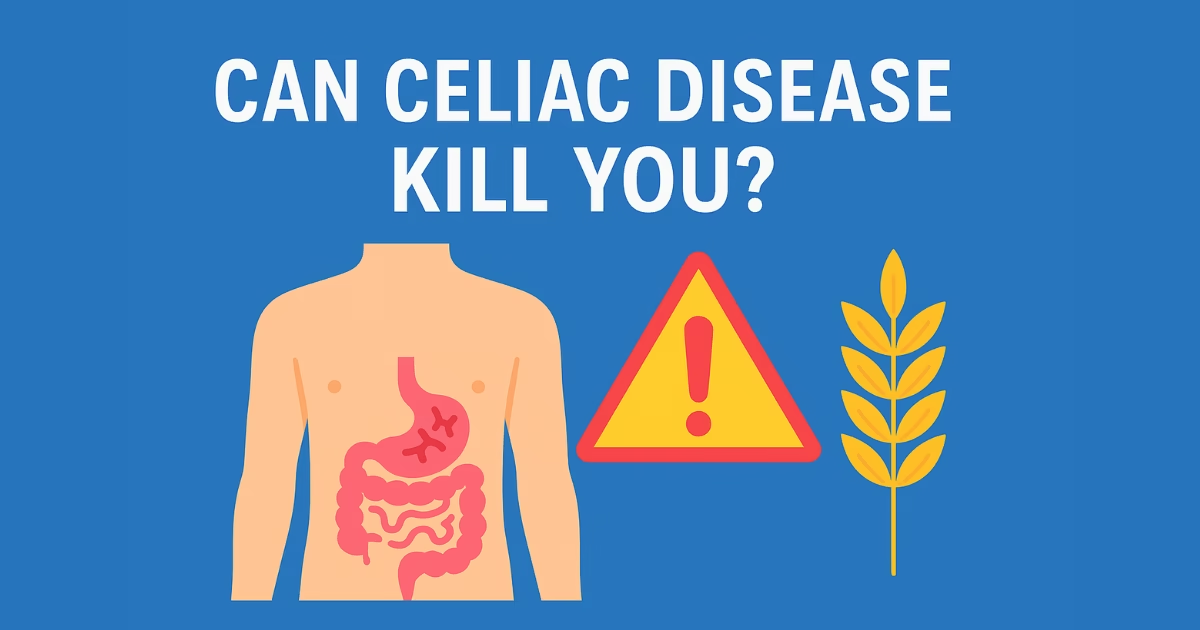Celiac disease often gets mistaken for a simple food sensitivity. But it’s much more serious than that. It’s an autoimmune condition where the body attacks its own small intestine when gluten is eaten. Over time, this can lead to damage that affects more than just digestion.
Many people ask, can celiac disease kill you? It sounds extreme, but the truth is, if left untreated, the condition can lead to life-threatening complications. From nutrient deficiencies to certain types of cancer, ignoring celiac disease isn’t harmless.
This article breaks down what happens when celiac disease goes untreated. It explains the risks, symptoms, and how to prevent those dangers. Whether someone is newly diagnosed or just curious, understanding the seriousness of this condition could save a life.
Can Celiac Disease Kill You? Understanding the Real Risk
The short answer is yes, but it’s rare. Celiac disease itself doesn’t directly kill a person. However, what it does to the body over time can lead to fatal outcomes. When someone with celiac eats gluten, even tiny amounts, their immune system attacks the small intestine. This causes inflammation and slowly damages the lining, making it hard to absorb nutrients.
Over the years, this constant damage can result in serious complications. Some people develop severe malnutrition, anemia, or even bone disorders. In very rare cases, untreated celiac disease can lead to a type of cancer known as intestinal lymphoma.
The key point is this — celiac disease is not harmless. It’s not just about avoiding bread. If it’s ignored or undiagnosed, it can quietly harm the body from the inside out. The danger is real, and the risks grow the longer it goes untreated.
What Happens If Celiac Disease Is Left Untreated?
Leaving celiac disease untreated can cause serious harm. The longer gluten keeps damaging the small intestine, the worse it gets. The body stops absorbing important nutrients like iron, calcium, and vitamins. That leads to problems like anemia, weak bones, and even infertility.
Some people may lose weight without trying. Others feel tired all the time, even after sleeping well. Over time, the body breaks down. In kids, it can slow down growth. In adults, it can raise the risk of other autoimmune diseases, such as Type 1 diabetes or thyroid disorders.
The scary part? Some people have silent celiac. They don’t show obvious symptoms, so they don’t know it’s harming them inside. That’s why early diagnosis is so important. Untreated celiac disease is not just uncomfortable — it’s dangerous.
Serious Complications That Can Become Life-Threatening
Most people with celiac won’t face deadly problems if they follow a gluten-free diet. But ignoring the condition can lead to dangerous outcomes. One of the most serious is Refractory Celiac Disease. It’s rare but deadly. In this form, the gut doesn’t heal even without gluten. That often leads to rapid weight loss, malnutrition, and a higher risk of cancer.
Another major risk is intestinal lymphoma, a rare but aggressive cancer. Studies show that people with untreated celiac disease are at higher risk of developing this cancer in the small intestine. There’s also celiac crisis, a sudden and severe form of the disease. It causes extreme diarrhea, dehydration, and low blood pressure. It can be deadly without fast treatment.
Other complications include osteoporosis, liver problems, and nervous system issues. These don’t always kill, but they lower quality of life and can make everyday living difficult.
Who Is Most at Risk of Complications or Death?
Not everyone with celiac disease faces the same risk. The danger increases if the condition stays undiagnosed or ignored. People who continue to eat gluten, whether knowingly or not, are more likely to suffer complications. That includes those who cheat on their diet or are unaware they even have the disease.
Older adults tend to face more severe symptoms. Their bodies may not recover as quickly. Also, people with other autoimmune diseases may face double the trouble. Their immune systems are already struggling.
Some people have silent celiac disease. They feel fine, but their intestines are still being damaged. These individuals might not seek help until serious issues appear. By then, it could be too late. So, regular testing and strict diet habits are key to avoiding the worst.
Early Warning Signs You Should Never Ignore
Celiac disease doesn’t always scream for attention. Sometimes, it whispers. But even those small signs matter. One of the most common early signs is constant stomach issues — bloating, gas, or diarrhea. Some may feel tired all the time or lose weight for no reason.
There’s also dermatitis herpetiformis, a skin rash that itches badly. Mouth ulcers and weak teeth can be warning signs too. In women, missed periods or fertility problems may pop up. In kids, growth might slow down.
Then there are mental signs. Brain fog, anxiety, and depression aren’t rare in untreated celiac patients. These symptoms may not look like gut problems, but they are linked.
Ignoring early signs lets the disease grow stronger. That’s why people should not brush off repeated stomach trouble, even if it seems minor.
How to Prevent the Worst: Diagnosing and Treating Celiac Early
The only way to prevent serious outcomes is by catching the disease early and sticking to treatment. That starts with getting the right tests. Blood tests can check for celiac-related antibodies. If those are high, doctors usually follow up with an endoscopy to see the intestine damage.
Once diagnosed, treatment is all about diet. A strict gluten-free diet is the only proven way to manage the disease. That means no wheat, barley, rye, or anything made with those grains. Even a small amount of gluten can trigger damage.
People also need to watch for hidden gluten in sauces, medicines, or snacks. It’s not always easy, but it’s worth it. With proper care and regular check-ups, most people live healthy, normal lives.
Early diagnosis and good habits truly save lives when it comes to celiac.
Can You Live a Long Life With Celiac Disease?
Yes, absolutely. Most people with celiac disease live long, full lives — if they follow a strict gluten-free diet. Once gluten is removed, the intestine can start to heal. Symptoms often get better in weeks or months. But it takes staying committed every day.
The challenge is staying 100% gluten-free, which isn’t always easy. Cross-contact at restaurants or misreading food labels can cause setbacks. But people who stay on track tend to stay healthy.
According to studies, life expectancy for those with treated celiac disease is nearly the same as for those without it. The real risk is ignoring the diagnosis or cheating on the diet.
In short, celiac doesn’t have to shorten your life — but only if you take it seriously.
Celiac Disease vs Gluten Intolerance: Don’t Confuse the Two
People often mix up celiac disease with gluten intolerance. But they are not the same. Celiac disease is an autoimmune condition. It damages the small intestine and causes long-term problems if untreated. Even a crumb of gluten can cause harm.
Gluten intolerance or non-celiac gluten sensitivity, on the other hand, doesn’t damage the gut. It causes symptoms like bloating, headaches, or tiredness, but without the severe consequences. It’s uncomfortable, but not life-threatening.
Only celiac disease can lead to cancer or organ damage if ignored. That’s why getting a proper diagnosis is so important. Never assume it’s just a “sensitivity.” Always talk to a doctor and get tested.
Final Thoughts: So, Can Celiac Disease Kill You?
To wrap it up — can celiac disease kill you? Sadly, yes. But only in rare cases, and mostly when it’s undiagnosed or ignored. The real danger comes from long-term damage caused by gluten and the serious complications that follow.
But there’s good news. Celiac disease is manageable. With early diagnosis, proper diet, and some care, people can avoid the worst and live well. It takes effort and some lifestyle changes, but the reward is worth it — a healthy, full life.
No one should take celiac lightly. It’s not a fad or food trend. It’s a medical condition that deserves respect, attention, and action.
FAQs About Celiac Disease
1. Can celiac disease kill you?
Yes, in rare cases. If untreated, it can lead to life-threatening issues like cancer or severe malnutrition.
2. What happens if celiac disease is not treated?
Untreated celiac can damage the intestines, cause nutrient loss, and raise the risk of serious complications.
3. Is celiac disease the same as gluten intolerance?
No. Celiac is an autoimmune disorder. Gluten intolerance doesn’t cause permanent damage.
4. Can you live a normal life with celiac disease?
Yes. With a strict gluten-free diet, most people live long and healthy lives.
5. How do you know if you have celiac disease?
Common signs include stomach pain, weight loss, tiredness, or skin rashes. Diagnosis needs blood tests and sometimes an endoscopy.
6. Is there a cure for celiac disease?
No cure yet. The only treatment is a lifelong gluten-free diet.

Hi, I’m Shafy Ali – a curious mind and passionate writer at Celiac Magazine. I cover a little bit of everything, from everyday tips and how-tos to deeper dives into topics that spark conversation. I enjoy turning research into readable, relatable content that informs and inspires. Whatever the subject, I aim to keep it clear, engaging, and genuinely useful.

